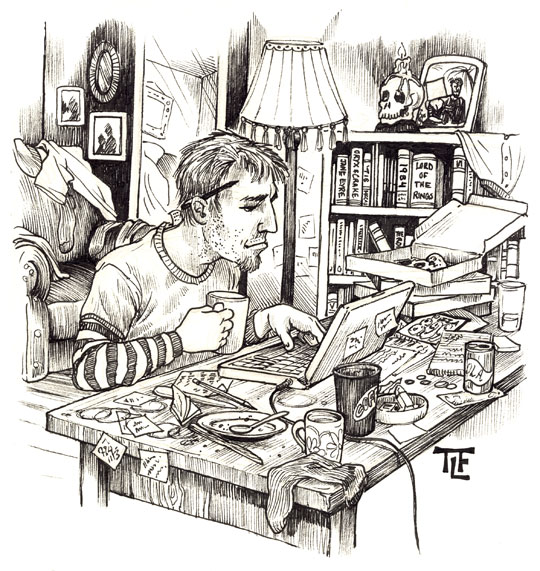The other day a friend came to me because he heard about the openlaws.eu project. He said: “Hey, openlaws sounds great – does that mean that I can write my own laws now?”. I had to tell him no, but that it was almost as good as that… Continue reading »
VoxPopuLII
 Raise your hand if you’ve heard (or said) a variation of one of these tired truisms: “Politics is dominated by lobbyists and spending.” “Policy making has degenerated into a glorified yelling match.” “Our country has never been more polarized.” “Today’s online communities foster echo chambers of the like-minded rather than fora for discussion.”
Raise your hand if you’ve heard (or said) a variation of one of these tired truisms: “Politics is dominated by lobbyists and spending.” “Policy making has degenerated into a glorified yelling match.” “Our country has never been more polarized.” “Today’s online communities foster echo chambers of the like-minded rather than fora for discussion.”
Is your hand raised? Because ours certainly are.
The only thing anyone can seem to agree on today is that the current U.S. political system is broken. We’re mired in a confluence of corporate spending, ugly discourse, and voter voicelessness.
LexPop provides an open public platform for tackling these problems.
Meet LexPop
LexPop allows participants to collaborate in the creation of legislative bills — bills that are later introduced by actual legislators. At its most basic, LexPop is a Wikipedia for creating public policy. (There’s a lot more to it than that, as we’ll explain below.) In our first project, Massachusetts Representative Tom Sannicandro (D-Ashland) — one of those actual legislators we’re talking about — has agreed to introduce a net neutrality bill created on LexPop.
LexPop has two primary goals. Our first goal is to give the public a voice. We hope to provide a space for ordinary people (i.e., people who can’t afford to hire lobbyists) to contribute substantively to public policy — to give their best ideas a fair hearing.
As you know, lobbyists write the bulk of the legislation coming out of our various legislatures. LexPop provides a counterpoint to the current model — a way for the public to provide legislators with voter-created model legislation. A legitimate, 21st-century democracy will invite the public into meaningful collaboration, and LexPop is part of the march in that direction.
Our second goal is to determine the best way to achieve the first. That is, a compelling movement is attempting to take governance into the 21st century, and organizations like PopVox and OpenCongress are doing great work. Several organizations and initiatives, including a government-sponsored effort in Brazil, are trying to make it possible for citizens to help write legislation. But at this point, nobody knows the best way to make the co-creation of laws a reality. Our work will contribute to figuring out what’s possible, what works, and what doesn’t.
How LexPop works
There are two ways to use LexPop. Our primary focus is on Policy Drives — where legislators pledge to introduce bills written on the site. Policy Drives are somewhat analogous to what goes on at Wikipedia, but LexPop provides more structure through the use of three specific phases:
- Phase 1: Initial discussion, debate, argument, and research;
- Phase 2: Outlining the bill in plain English (for those who aren’t regular readers of Vox PopuLII); and
- Phase 3: Transforming the ‘plain English’ outline into legislative text.
We’re currently in the discussion phase of our first Policy Drive, devoted to the net neutrality bill Rep. Sannicandro has agreed to introduce.
A second option on LexPop is working on a “WikiBill.” WikiBills are written via the familiar, wide-open wiki model, and they offer a spot for the public to create model legislation on their own, without the three-phase structure of Policy Drives, and without a legislator-sponsor. WikiBill creators collaborate through a free-for-all process, very similar to Wikipedia — start from scratch and cobble the bill together. There’s no end to the WikiBill process, so participants can create a bill, submit it to their representatives, modify it, and submit it again.
Yeah, sounds great. But can this really work?
It’s usually at this point in the conversation that questions start coming up. LexPop, and similar projects, are largely operating in uncharted waters, and so there’s good reason to think the project sounds ambitious, perhaps even crazy. Below are a few of the questions we’re asked most often, along with our preliminary answers.
Will anyone contribute to this sort of effort?
We think so. (Obviously.)
Here’s why: Ordinary people collaborate on difficult projects online — especially online — often with great success. Take Linux, the open source operating system. The vast majority of people who work on Linux aren’t paid; they’ve incrementally created it in their spare time.
Are you reading this blog on Firefox? Well, guess what? Your browser was built almost entirely by volunteers.
At LexPop, we’re asking people who are passionate about certain issues to give some of their free time to developing better policy, in the same way engineers have asked them to help develop software. Sure, it will be complicated, but people are smart, and given the right opportunity and tools, they’ll be able to (once again) create something extraordinary.
Politics is too controversial — How can you expect people to come to consensus on one answer?
To answer this question, we like to look to Jesus — the “Jesus” page on Wikipedia, that is.
There are plenty of controversial topics addressed on Wikipedia, but it’s the pages for these topics that are often the most accurate. Wikipedians who edit the Jesus page know the topic is controversial, so they back up what they say with facts — otherwise, the crowd of users won’t allow it. Over time, the Jesus page has turned into something that most users are pretty happy about. And this is the similarity between LexPop and Wikipedia: They’re both about collaboratively writing something that isn’t perfect in the eyes of any one participant, but is better than the alternative.
Fine, but isn’t there a better model than a wiki?
This is one of the things we’re trying to figure out, and one of the things with which we need your help. We’re starting with a modified wiki (the three phases), but as we learn, we’ll adapt. A wiki allows a certain type of collaboration (the kind found on Wikipedia), but it may not be the best way to collaborate. Is the three-step process we’re using the right model, or should the phases be combined? With your help, we’ll find out — and we promise to share our findings.
Will legislation created on LexPop be representative?
We don’t claim that bills made on LexPop will be perfectly representative, and we’re not trying to make representative democracy obsolete. After a bill is written on the site, it will still have to go through the same bill-into-law process as every other piece of legislation.
But LexPop will certainly be more representative than the system we have now. With LexPop, non-profit organizations with valuable knowledge of an issue, passionate experts well-versed on a topic, and regular voters (Joes the Plumber, if you will) will no longer be shut out of the process. Right now, we live in a world where participation too often means a voter pours out her heart in a letter and receives a form response that the intended recipient didn’t write, read, or even sign. Our system for adding more voices to lawmaking may not be perfect, but it will be less imperfect than the current political system.
LexPop provides a first draft of legislation that’s written by people, not by lobbyists. This is our value-add; we’re opening a new channel for public participation, and taking a step toward a more legitimate and deliberative democracy.
But we need your help
And we need it big time. For a project like this to work, we need participants.
If you’re interested in collaborative democracy, please get involved in the conversation. You’ll be helping even if you post only one comment. Even if you aren’t particularly interested in net neutrality, we encourage you to learn more about it on the site, and then make sure you come back when we have a Policy Drive on your favorite issue.
Also, we’d be grateful if you spread the word about our site. Like us on Facebook, Tweet about LexPop (@LexPopOrg), blog about us, or, even better, let us write a guest blog post on your site (Thanks, VoxPopuLII !).
We’d also love for you to tell us what we’re doing wrong. LexPop is perfect in neither theory nor practice. So please help us make LexPop and, ultimately, deliberative democracy better with your feedback. We have a Google Group for discussion about LexPop, or you can contact us through the website.
Coda
LexPop is a platform for public engagement and empowerment. LexPop provides a space for discussion-driven public policy and a stronger, more agile democracy. LexPop is about more voices. Add yours.
 Matt Baca is a joint J.D./M.P.A. student at New York University School of Law and the Harvard Kennedy School. He’s interested law, public policy, government 2.0, and the Rockies (team and mountains).
Matt Baca is a joint J.D./M.P.A. student at New York University School of Law and the Harvard Kennedy School. He’s interested law, public policy, government 2.0, and the Rockies (team and mountains).
 Olin Parker is a Master’s in Public Policy student at the Harvard Kennedy School. His interests include disability policy, education reform, the states of Kansas and Louisiana, and his 17 month-old daughter.
Olin Parker is a Master’s in Public Policy student at the Harvard Kennedy School. His interests include disability policy, education reform, the states of Kansas and Louisiana, and his 17 month-old daughter.
VoxPopuLII is edited by Judith Pratt. Editor in chief is Robert Richards.












